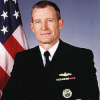Dennis C. Blair

Dennis C. Blair
Dennis Cutler Blair is the former United States Director of National Intelligence and is a retired United States Navy admiral who was the commander of U.S. forces in the Pacific region. Blair was a career officer in the U.S. Navy and served in the White House during the presidencies of both President Jimmy Carter and President Ronald Reagan. Blair retired from the Navy in 2002 as an Admiral. In 2009, Blair was selected as President Barack Obama’s first Director of...
NationalityAmerican
ProfessionPublic Servant
CountryUnited States of America
The bottom line is these techniques have hurt our image around the world, the damage they have done to our interests far outweighed whatever benefit they gave us and they are not essential to our national security.
As I've said many times and publicly, a war between China and Taiwan that involves the United States is a lose-lose-lose.
In addition to anti-American terrorists with global reach, our adversaries include organizations - some nation states, some private and some criminal - that proliferate weapons of mass destruction and the means to deliver them.
I like to think I would not have approved those methods in the past, but I do not fault those who made the decisions at that time, and I will absolutely defend those who carried out the interrogations within the orders they were given.
As is often the case when things are complicated, extreme views have superficial appeal. On the one extreme, some see China as an inevitable enemy that must be contained; on the other hand, there are those who see China as a slowly developing democracy that can be embraced.
The use of large-scale military force in volatile regions of underdeveloped countries is difficult to do right, has major unintended consequences and rarely turns out to be quick, effective, controlled and short lived.
Southeast Asia is an area in which there is a form of Islam which is both devout and progressive, and therefore to be supported. It's an area in which I see a congruence of American interests and local interests: to have tolerant societies and become more prosperous.
I know it sounds Pollyannish and 'Kumbaya'-like, but I find that the more that you expose Americans to the diversity of what's going on in China and vice versa, the more people find that there is this broad middle path. And so I'm a strong advocate of intense visits and dialogue back and forth.
There are many causes of violent deaths in America - murders and traffic accidents - that we do not approach with the same 'no price too steep, no task too difficult' approach that we take toward al Qaeda.
The Industrial Revolution caused a centuries-long shift in power to the West; globalization is now shifting the balance again.
I think you can go back in history and look at what the effect in Asia and the world was of a divided, fractured China from, you know, the opium wars through the Chinese civil war, and I don't think it was pretty for Asia or the world.
The information gained from these techniques was valuable in some instances, but there is no way of knowing whether the same information could have been obtained through other means.
High value information came from interrogations in which those methods were used and provided a deeper understanding of the al Qa'ida organization that was attacking this country.
All officers of the Intelligence Community, and especially its most senior officer, must conduct themselves in a manner that earns and retains the public trust. The American people are uncomfortable with government activities that do not take place in the open, subject to public scrutiny and review.